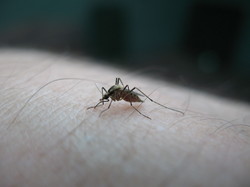Washtenaw County public health officials on the hunt for West Nile virus
Thought the West Nile virus was so five years ago? Think again.
With mosquitos in full force, Washtenaw County health officials say they're on the lookout for cases of West Nile virus and need the public's help to find it.

On Thursday, the county health department announced limited annual surveillance for the West Nile virus has begun. County residents are asked to report any dead birds they find and are being urged to prevent mosquito bites.
The hotline for reporting dead birds is 734-544-6750.
The West Nile virus is a mosquito-borne virus that can cause mild-to-severe illness in humans and other animals. Mosquitoes become infected with West Nile virus when they feed on infected birds that carry the virus in their blood. Crows, blue jays and raven are particularly susceptible to the disease and can be a good indicator for the presence of the virus, said Laura Bauman, epidemiologist for the county.
FIND OUT MORE
For more information on the West Nile virus, visit the county's website at http://westnile.ewashtenaw.org, the state website at www.michigan.gov/westnilevirus or the Centers for Disease Control & Prevention website at www.cdc.gov/westnile.
“Although the past two summers have been mild, and Washtenaw County hasn't had a human case reported since 2006, West Nile virus is endemic and has the potential to become more active again,” Dr. Diana Torres-Burgos, Washtenaw County's medical director, said in a statement.
About 20 percent of those who are infected with the virus become ill within 15 days of a bite from an infected mosquito. Symptoms can range from slight fever, headache, body aches and rash to high fever, severe headache, stiff neck, mental confusion, convulsions, muscle weakness and paralysis.
Residents are also asked to empty any standing water from buckets, flowerpots, saucers, pools, patio furniture covers or other sites on their property where mosquitoes can lay eggs. It is also suggested residents keep tall weeds trimmed from areas where humans spend their time outdoors.
Tina Reed covers health and the environment for AnnArbor.com. You can reach her at tinareed@annarbor.com, call her at 734-623-2535 or find her on Twitter @TreedinAA.


Comments
Epengar
Mon, Jun 14, 2010 : 12:09 p.m.
My first evidence is that the professionals who are paid to find efficient ways to manage stormwater think they are a good idea. You're the one contradicting them, why can't you back up your objection with some support? If you think a constructed swale is the same as a swamp, you don't know what you're talking about.
yohan
Sat, Jun 12, 2010 : 3:18 p.m.
No, do you have any evidence that they DO work? Swamps made be good from a hydrological viewpoint but from a health perspective they are a disaster. Swamps have been associated with disease and illness for many centuries. Just because you call it a swale doesn't make it any healthier. I am for clean water as much as most other people but I think you have to look at the big picture and include the health implications. Now if you want to think about COVERED retention basins with porous bottoms (like some cisterns) then we can make some TRUE ecological progress and not just chase eco fads
Epengar
Sat, Jun 12, 2010 : 7:40 a.m.
Why do you think they'd get clogged? They're trapping stormwater running off streets and parking lots, so where's that big load of silt coming from? They're also vegetated, so any silt particles that do get washed into them are likely to get bound into soil and roots. Finally, if a swale does somehow get clogged, it's pretty cheap for it to be excavated and cleared. Swales are good for the environment (by keeping stormwater from getting dumped into streams) but they are also a cheap way to reduce the load on the storm drain system. That saves money. Have you got some evidence that swales don't work?
yohan
Sat, Jun 12, 2010 : 2:24 a.m.
And then what happens when the porous bottom becomes clogged with silt? Stormwater swales= ignorant environmental fad.
Epengar
Fri, Jun 11, 2010 : 10:18 p.m.
^"Inconvenient truth?" no, just another ignorant crack. Stormwater swales are built with porous bottoms, so the water they trap drains down into the soil over a few days or a week, and has drained away before mosquitos can complete their life cycle. Usually they drain in a few days. They are pretty much the opposite of "purpose-built swamps."
sambra
Fri, Jun 11, 2010 : 7:58 a.m.
"It is also suggested residents keep tall weeds trimmed from areas where humans spend their time outdoors." Maybe Ann Arbor should try to mow the parks and other areas under their care a little more often before they contribute to the problem.
81wolverine
Fri, Jun 11, 2010 : 7:37 a.m.
Mosquitos in general are very bad this year. Sometimes, they say to empty bird baths too. But, that is unnecessary if you simply change the water several times a week. And the birds need the water during these hot days of spring/summer.
yohan
Fri, Jun 11, 2010 : 6:04 a.m.
From the article:"Residents are also asked to empty any standing water from buckets, flowerpots, saucers, pools, patio furniture covers or other sites on their property where mosquitoes can lay eggs" But if you call it a "SWALE" then it it OK. Has anybody considered how much these purposely constructed swamps have contributed to the mosquito / West Nile Virus problem? Maybe an "inconvenient truth"?